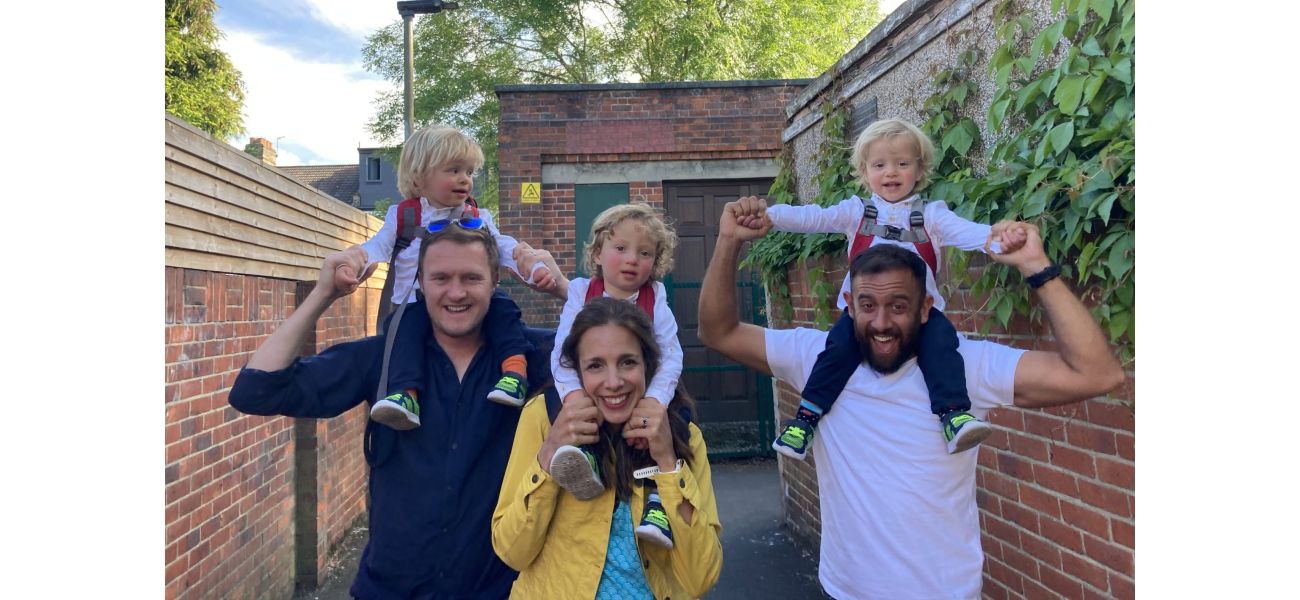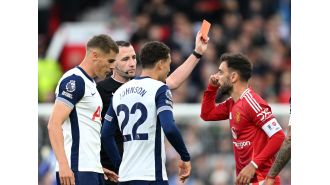Having triplets is a blessing, but financially, it's a struggle.
Before giving birth, we had already spent £13,000 on the triplets for basic necessities.
December 3rd 2024.

My brother posed a simple yet thought-provoking question to me, "How much do you love your job? Enough to do it for free?" I was taken aback and found myself at a loss for words. He had been by my side throughout the ups and downs of building our publishing business, and we had both made numerous sacrifices over the past ten years. He knew how much my work meant to me, but he had also witnessed my struggles with trying to start a family.
And now, it seemed that I had gotten more than I bargained for - quite literally. After crunching the numbers on a calculator, I realized that in order to cover the nursery fees for my triplets, I would need a salary of £85k - a figure that I had never earned in my life. Unfortunately, this was not an uncommon situation for parents like me, as The Twins Trust's research showed that the UK was one of the worst places in the world to raise multiple children due to financial, social, emotional, and health challenges.
I was in for a big surprise during my first scan when the consultant revealed not one, but three beating hearts on the screen. It was a problem I never expected to encounter. To be honest, my initial concern was whether my husband, James, and I would ever become parents. I had previously conceived twice, but both pregnancies ended in miscarriage within the first eight weeks. The first time, I even had to undergo emergency surgery due to excessive bleeding. The physical toll was immense, but the emotional grief was even greater. The second pregnancy ended in heartbreak as well, so when I fell pregnant for the third time, I couldn't help but feel anxious.
But as the weeks went by, everything seemed to be progressing smoothly, and soon it was time for my first heartbeat scan. Imagine my shock when the consultant revealed not one, but three beating hearts. I was completely paralyzed, and even when the appointment was over and they asked me to put my knickers back on, I couldn't move.
There were no twins or triplets in my family, and we hadn't done anything differently this time around, so it was hard to wrap my head around the fact that I was carrying three babies. My husband couldn't be there for the scan due to Covid, so he was waiting anxiously in the carpark, fully expecting bad news. When I told him the news, he was overjoyed, but also cautious. We knew the road ahead would be long and treacherous, and we were all too aware of how easily things could go wrong.
We didn't even consider the potential costs until we visited Mamas & Papas and a saleswoman tried to sell my husband an expensive travel system. Seeing the price tags and realizing that we would need three of everything was sobering. During our next scan, the consultant suggested the option of selective reduction - aborting one of the embryos to reduce the risks associated with a multiple pregnancy. I was devastated at the mere thought of it.
Afterwards, I spoke to my brother about it, still upset by the suggestion. He reminded me that for some parents, it may be the safer choice if they can't afford to raise multiple children. It was a reality check, but little did I know just how expensive things were about to become.
Before I even gave birth, we had already spent over £13,000 on the triplets, and that barely covered the essentials. Like 72% of multiple parents, we had to purchase a bigger vehicle to fit our growing family, which meant selling our old car and buying a secondhand van. And of course, we needed three car seats, three cots, and a triple pram - a steal at only £400.
I became quite savvy at finding good deals on platforms like eBay, Gumtree, and Facebook Marketplace, but the costs still added up quickly. We needed new mattresses and bedding for the cots, a white noise machine, a nappy caddy, a changing bag, and all the necessary supplies like diapers and wipes. It felt like the costs were spiraling out of control.
My brother posed an interesting question to me, one that really made me stop and think. "How much do you love your job?" he asked. "Enough to do it for free?" As my business partner, he had seen the blood, sweat, and tears that I had poured into our publishing business over the years. We had both sacrificed so much to make it a success. He knew just how much it meant to me. However, he had also witnessed my struggles to conceive a child.
And now, it seemed that I had gotten more than I bargained for – quite literally. After calculating the costs, I realized that I would need to earn a salary of £85k just to cover the nursery fees for my triplets. That was a figure I had never come close to earning in my life. Sadly, this was not an uncommon situation for parents like me. According to research, the UK is one of the worst places in the world to raise multiples due to the financial, social, emotional, and health challenges that come with it.
I was completely taken aback when the consultant revealed not one, but three beating hearts during my first ultrasound. This was a problem I never expected to have. To be honest, my initial concern was simply whether my husband James and I would ever be parents. We had experienced two miscarriages before, both within the first eight weeks of pregnancy. The first time, I even had to undergo emergency surgery due to excessive bleeding. It took me six months to physically recover, but the emotional toll was much harder to overcome. The second miscarriage, a year later, was just as heartbreaking. So, when I found out I was pregnant again, I couldn't help but feel anxious.
But as the weeks went by, everything seemed to be progressing smoothly. I was relieved to be booking my first heartbeat scan. And that's when the consultant showed me the three little hearts beating on the screen. "You can put your knickers back on," they said at the end of the appointment, but I couldn't move. It was hard to believe that there were no twins or triplets in my family. We hadn't done anything differently this time around, yet here we were – expecting triplets.
James couldn't even be there for the scan, as he had contracted Covid. He was anxiously waiting for me in the car park, expecting the worst. When I told him the news, he was overjoyed, but also cautious. We both knew the risks and challenges that lay ahead. It wasn't until we went to Mamas & Papas to look at baby gear that we truly realized the financial burden we were facing. The prices were eye-opening, to say the least.
At our next scan, the consultant suggested considering selective reduction – a procedure where one or more embryos or fetuses are aborted in order to reduce the risks of complications in a multiple pregnancy. The mere thought of it made me cry. There was no way I could consider it unless it was absolutely necessary for the safety of myself or the babies. When I talked to my brother about it later, he reminded me that for some parents, this might be the only option they can afford. It was a harsh reality check.
Little did I know, the expenses were just beginning. Before the triplets were even born, we had spent over £13,000 on them. And that was just for the bare essentials. Like many other multiple parents, we had to sell our old car and buy a bigger vehicle to fit our growing family. We found a used van that could accommodate all of us, along with car seats, cots, and a triple pram – a steal at £400. I became an expert at finding deals on sites like eBay, Gumtree, and Facebook Marketplace. But even with these bargains, the costs continued to add up.
We bought new mattresses and bedding for the cots, a white noise machine, a nappy caddy, a changing bag, and all the necessary supplies like diapers and wipes. It felt like the expenses were spiraling out of control. But despite it all, I wouldn't trade my three beautiful children for anything in the world. They were worth every penny and more.
And now, it seemed that I had gotten more than I bargained for - quite literally. After crunching the numbers on a calculator, I realized that in order to cover the nursery fees for my triplets, I would need a salary of £85k - a figure that I had never earned in my life. Unfortunately, this was not an uncommon situation for parents like me, as The Twins Trust's research showed that the UK was one of the worst places in the world to raise multiple children due to financial, social, emotional, and health challenges.
I was in for a big surprise during my first scan when the consultant revealed not one, but three beating hearts on the screen. It was a problem I never expected to encounter. To be honest, my initial concern was whether my husband, James, and I would ever become parents. I had previously conceived twice, but both pregnancies ended in miscarriage within the first eight weeks. The first time, I even had to undergo emergency surgery due to excessive bleeding. The physical toll was immense, but the emotional grief was even greater. The second pregnancy ended in heartbreak as well, so when I fell pregnant for the third time, I couldn't help but feel anxious.
But as the weeks went by, everything seemed to be progressing smoothly, and soon it was time for my first heartbeat scan. Imagine my shock when the consultant revealed not one, but three beating hearts. I was completely paralyzed, and even when the appointment was over and they asked me to put my knickers back on, I couldn't move.
There were no twins or triplets in my family, and we hadn't done anything differently this time around, so it was hard to wrap my head around the fact that I was carrying three babies. My husband couldn't be there for the scan due to Covid, so he was waiting anxiously in the carpark, fully expecting bad news. When I told him the news, he was overjoyed, but also cautious. We knew the road ahead would be long and treacherous, and we were all too aware of how easily things could go wrong.
We didn't even consider the potential costs until we visited Mamas & Papas and a saleswoman tried to sell my husband an expensive travel system. Seeing the price tags and realizing that we would need three of everything was sobering. During our next scan, the consultant suggested the option of selective reduction - aborting one of the embryos to reduce the risks associated with a multiple pregnancy. I was devastated at the mere thought of it.
Afterwards, I spoke to my brother about it, still upset by the suggestion. He reminded me that for some parents, it may be the safer choice if they can't afford to raise multiple children. It was a reality check, but little did I know just how expensive things were about to become.
Before I even gave birth, we had already spent over £13,000 on the triplets, and that barely covered the essentials. Like 72% of multiple parents, we had to purchase a bigger vehicle to fit our growing family, which meant selling our old car and buying a secondhand van. And of course, we needed three car seats, three cots, and a triple pram - a steal at only £400.
I became quite savvy at finding good deals on platforms like eBay, Gumtree, and Facebook Marketplace, but the costs still added up quickly. We needed new mattresses and bedding for the cots, a white noise machine, a nappy caddy, a changing bag, and all the necessary supplies like diapers and wipes. It felt like the costs were spiraling out of control.
My brother posed an interesting question to me, one that really made me stop and think. "How much do you love your job?" he asked. "Enough to do it for free?" As my business partner, he had seen the blood, sweat, and tears that I had poured into our publishing business over the years. We had both sacrificed so much to make it a success. He knew just how much it meant to me. However, he had also witnessed my struggles to conceive a child.
And now, it seemed that I had gotten more than I bargained for – quite literally. After calculating the costs, I realized that I would need to earn a salary of £85k just to cover the nursery fees for my triplets. That was a figure I had never come close to earning in my life. Sadly, this was not an uncommon situation for parents like me. According to research, the UK is one of the worst places in the world to raise multiples due to the financial, social, emotional, and health challenges that come with it.
I was completely taken aback when the consultant revealed not one, but three beating hearts during my first ultrasound. This was a problem I never expected to have. To be honest, my initial concern was simply whether my husband James and I would ever be parents. We had experienced two miscarriages before, both within the first eight weeks of pregnancy. The first time, I even had to undergo emergency surgery due to excessive bleeding. It took me six months to physically recover, but the emotional toll was much harder to overcome. The second miscarriage, a year later, was just as heartbreaking. So, when I found out I was pregnant again, I couldn't help but feel anxious.
But as the weeks went by, everything seemed to be progressing smoothly. I was relieved to be booking my first heartbeat scan. And that's when the consultant showed me the three little hearts beating on the screen. "You can put your knickers back on," they said at the end of the appointment, but I couldn't move. It was hard to believe that there were no twins or triplets in my family. We hadn't done anything differently this time around, yet here we were – expecting triplets.
James couldn't even be there for the scan, as he had contracted Covid. He was anxiously waiting for me in the car park, expecting the worst. When I told him the news, he was overjoyed, but also cautious. We both knew the risks and challenges that lay ahead. It wasn't until we went to Mamas & Papas to look at baby gear that we truly realized the financial burden we were facing. The prices were eye-opening, to say the least.
At our next scan, the consultant suggested considering selective reduction – a procedure where one or more embryos or fetuses are aborted in order to reduce the risks of complications in a multiple pregnancy. The mere thought of it made me cry. There was no way I could consider it unless it was absolutely necessary for the safety of myself or the babies. When I talked to my brother about it later, he reminded me that for some parents, this might be the only option they can afford. It was a harsh reality check.
Little did I know, the expenses were just beginning. Before the triplets were even born, we had spent over £13,000 on them. And that was just for the bare essentials. Like many other multiple parents, we had to sell our old car and buy a bigger vehicle to fit our growing family. We found a used van that could accommodate all of us, along with car seats, cots, and a triple pram – a steal at £400. I became an expert at finding deals on sites like eBay, Gumtree, and Facebook Marketplace. But even with these bargains, the costs continued to add up.
We bought new mattresses and bedding for the cots, a white noise machine, a nappy caddy, a changing bag, and all the necessary supplies like diapers and wipes. It felt like the expenses were spiraling out of control. But despite it all, I wouldn't trade my three beautiful children for anything in the world. They were worth every penny and more.
[This article has been trending online recently and has been generated with AI. Your feed is customized.]
[Generative AI is experimental.]
0
0
Submit Comment





